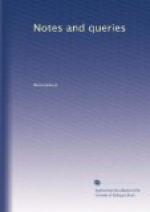first Jesuit who taught the Greek language at Messina;
he also gave public lectures on the Holy Scriptures
in Rome. He was appointed Rector of the German
College at Rome, shortly before his death, which occurred
on the 25th of October, 1556, three months and six
days after the death of Loyola. Frusius had studied,
with equal success, theology, medicine, and law:
he was a good mathematician, an excellent musician,
and made Latin verses with such facility, that he
composed them, on the instant, on all sorts of subjects.
But these verses were neither so elegant nor so harmonious,
as Alegambe asserts[1], since he adds, that it requires
close attention to distinguish them from prose.
Frusius translated, from Spanish into Latin, the
Spiritual
Exercises of Loyola. He was the author of
the following works:—Two small pieces,
in verse,
De Verborum et Rerum Copia, and
Summa
Latinae Syntaxeos: these were published in
several different places;
Theses Collectae ex Interpretatione
Geneseos; Assertiones Theologicae, Rome, 1554;
Poemata, Cologne, 1558—this collection
often reprinted at Lyons, Antwerp and Tournon, contains
255[2] epigrams against the heretics, amongst whom
he places Erasmus;—a poem
De Agno Dei;
and, lastly, another poem, entitled
Echo de Presenti
Christianae Religionis Calamitate, which has been
sometimes cited as an example of a great
difficulte
vaincue. The edition of Tournon contains
also a poem,
De Simplicitate, of which Alegambe
speaks with praise. To Frusius was also owing
an edition of Martial’s
Epigrams, divested
of their obscenities.
EDW. VENTRIS.
Cambridge, Jan. 10. 1850.
[Our valued correspondent, MR. MACCABE, has also informed
us that the “Epigrams of Frusius were
published at Antwerp, 1582, in 8vo., and at Cologne,
1641, in 12mo. See Feller’s Biographie.”]
[1] I presume in his Bibliotheca
Scriptorum Societatis
Jesu.
[2] Duthilloeul, according
to Mr. Bruce, says 251.
* * * *
*
OPINIONS RESPECTING BURNET
A small catena patrum has been given respecting
Burnet, as a historian, in No. 3. pp. 40, 41., to
which two more scriptorum judicia have been
appended in No. 8. p. 120., by “I.H.M.”.
As a sadly disparaging opinion had been quoted, at
p. 40., from Lord Dartmouth, I hope you will allow
the following remarks on the testimony of that nobleman
to appear in your columns:—
“No person has contradicted Burnet
more frequently, or with more asperity, than Dartmouth.
Yet Dartmouth wrote, ’I do not think he
designedly published anything he believed to be
false.’ At a later period, Dartmouth,
provoked by some remarks on himself in the second
volume of the Bishop’s history, retracted
this praise; but to such a retraction little importance




